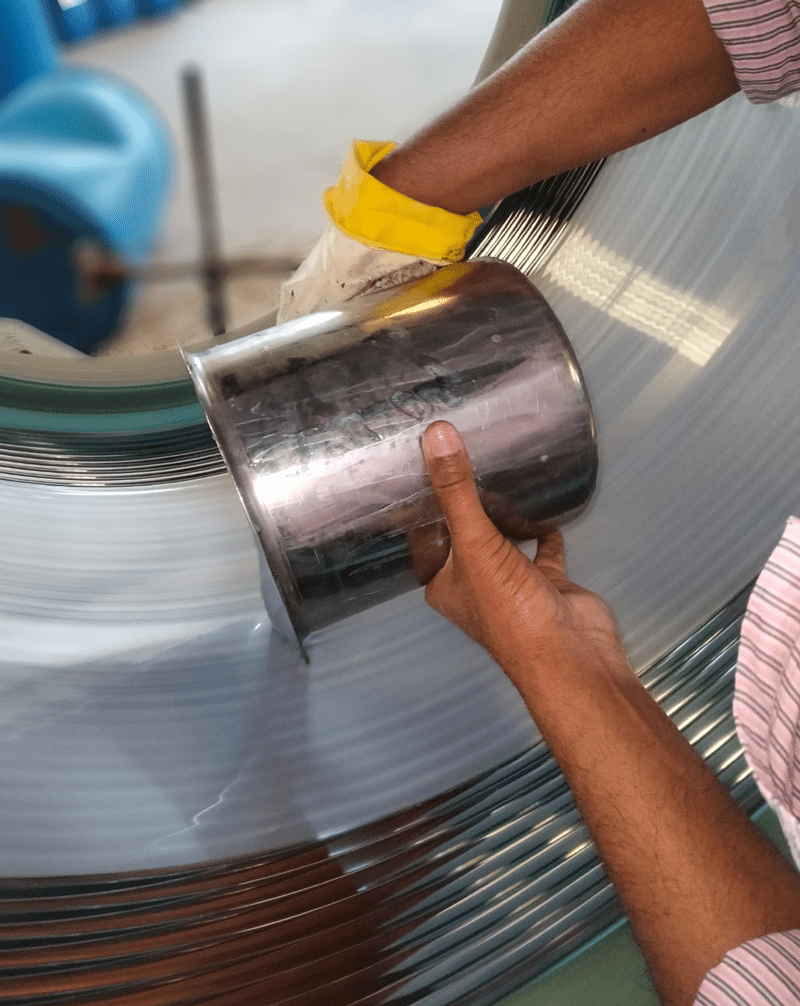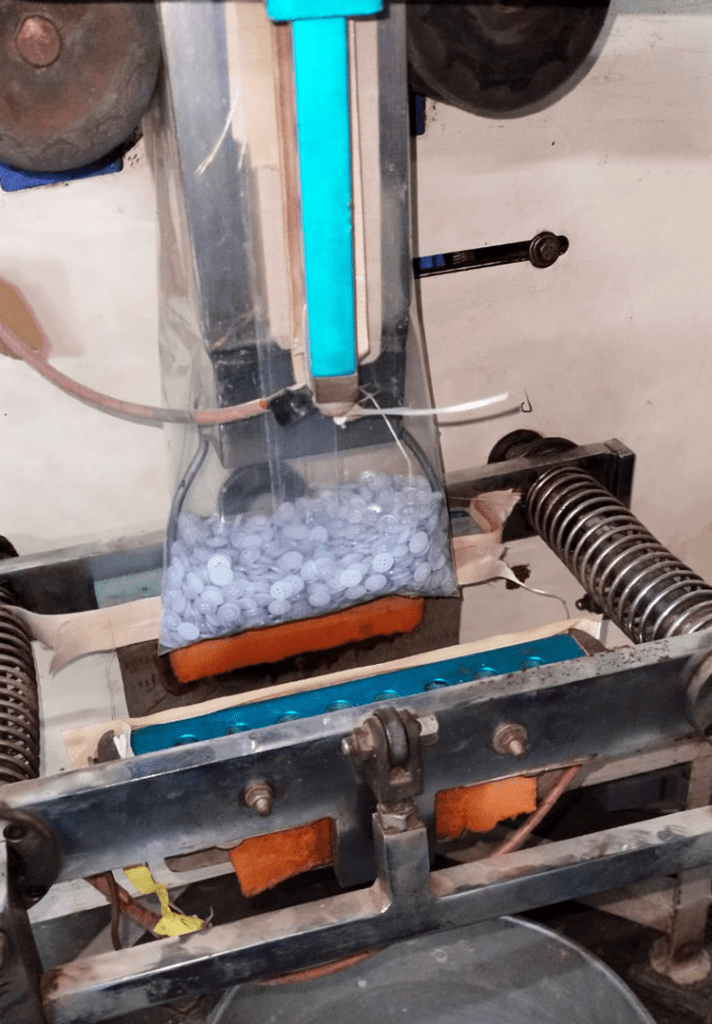From Chemistry to Craftsmanship
Creating Premium Garment Buttons
Polyester is a common type of material used for making buttons. A special sort of properties contained in Polyester makes it suitable for making buttons. We follow stringent quality control measures during our polyester buttons manufacturing process. The answer to how are plastic buttons manufactured lies in the detailed process followed by top button manufacturers in India. To make coloured buttons, we use a variety of pigments that are added to the polyester. The process for making buttons for garments begin with Batch Color Mixing, where Raisin, Styrene, Cobalt, Wax, Color, and the enchanting Pearl pigment are carefully blended in a drum according to specific requirements. This mixture forms the essence of the button’s unique formulation, with the addition of UV Tex if necessary. Notably, the inclusion of Pearl pigment adds a dazzling shine to the buttons. This shimmering touch enhances the aesthetic appeal, providing a subtle yet distinctive radiance to the final product. This is how are plastic buttons manufactured.
A critical player in this polyester buttons manufacturing process is the chemical catalyst, which hardens the polyester, fortifying it for durability. The inclusion of wax further enhances the tactile experience of the 2 hole and 4 hole shirt buttons. Following the initial stages of button blanking and machining, the process for making buttons for garments progresses to a meticulous finishing and polishing stage. The buttons then embark on a conveyor belt for visual inspection, a crucial quality control step. Defective buttons, marked by cracks or mis-cuts, are promptly identified and removed, leaving only flawless specimens during the polyester buttons manufacturing process. This is how are plastic buttons manufactured.

HEAT PROOF DYEABLE BUTTONS
We are one of the largest manufacturers of polyester buttons in India!
With a installed capacity of manufacturing 7 Million+ buttons daily, we stand tall as a stalwart in the realm of button manufacturing.





Step-1
BUTTON BLANKING
The process for making buttons for garments begin with a mixture of Unsaturated Polyester Resin, Styrene, Cobalt, Wax, and pigments, creating a tailored formulation. This concoction is cast into sheets, later punched into blanks. Simultaneously, raw materials are cast into shapes, subsequently sliced into blanks. This versatile process for making buttons for garments allows for the creation of 2 hole and 4 hole shirt buttons in various shapes and sizes. The precision achieved through casting and slicing ensures uniformity and flexibility in button design, laying the foundation for the subsequent stages of button manufacturing.
To understand how are plastic buttons manufactured, it is crucial to ensure that each step is followed with precision. In this intricate process for making buttons for garments, the introduction of pearl pigments adds a touch of sophistication and uniqueness to the buttons. The shimmering allure of pearl pigments enhances the aesthetic appeal, elevating the final product to a level of elegance.
Step-2
BUTTON MACHINING
The next step in the process of making buttons for garments is button machining. The cured blanks undergo shaping and design through turning machines, specifically button-making machines. Single-side turning machines focus on turning only the front of the 2 hole and 4 hole shirt buttons, while dual-side turning machines handle both sides. This pivotal stage of polyester buttons manufacturing process refines the buttons, imparting them with the desired shape and design. The precision achieved by these machines during polyester buttons manufacturing process ensures uniformity and consistency in the final product, laying the groundwork for the subsequent stages of finishing, polishing, and inspection in the polyester buttons manufacturing process. This is how are plastic buttons manufactured.
STEP-3
POLISHING & FINISHING
STEP-4
INSPECTION & PACKING
Following the meticulous polishing process for making buttons for garments, the 2-hole and 4-hole shirt buttons enter a phase of rigorous inspection designed to identify any breakage or faults. This final quality check is imperative, acting as the gatekeeper to ensure that only flawless buttons proceed to the packaging stage. The inspection process is a combination of manual scrutiny and the assistance of conveyor belts. Skilled inspectors carefully examine each button, scrutinizing for any imperfections that might have escaped earlier stages of the process for making buttons for garments.
Simultaneously, the use of conveyor belts streamlines the polyester buttons manufacturing process, facilitating a systematic and efficient examination of a large volume of buttons. Once approved, the buttons are meticulously packed and prepared for sale. Their refined appearance and durable quality make them poised to enhance garments, showcasing the meticulous craftsmanship and commitment to excellence that characterizes the entire polyester buttons manufacturing process.


PREMIUM FINISH

QUALITY CHECKED

SUPERIOR SHINE
Durability
Buy 2 hole and 4 hole shirt buttons from us as our buttons are celebrated for their durability. The synthetic nature of polyester makes these buttons resistant to moisture, chemicals, and abrasion. This durability ensures that clothing adorned with polyester buttons maintains its aesthetic appeal over time. The process for making buttons for garments followed by top manufacturers in Gujarat ensure that the durability of the 4 hole shirt buttons is maintained.
Affordability
Our polyester buttons have gained widespread popularity due to their cost-effectiveness. The process for making buttons for garments followed by top manufacturers in Gujarat prioritize the use of premium-quality raw materials, meticulously sourced and subjected to rigorous quality checks. This ensures that our 2-hole and 4-hole buttons meet stringent quality standards, allowing us to deliver optimal quality buttons at the most competitive prices in the market.
Versatility
Another answer to how are plastic buttons manufactured in India lies in the versatile nature of the 2 hole and 4 hole shirt buttons. Polyester buttons are highly versatile in terms of design possibilities. The molding process allows for intricate detailing, and the dyeing stage offers an extensive color palette. Buy 2 hole and 4 hole shirt buttons from Classic Buttons Private Limited as the versatility of our buttons make them suitable for a wide range of clothing styles and accessories.
weather Resistance
Polyester 2 hole and 4 hole shirt buttons exhibit remarkable resistance to the elements, making our 2 hole and 4 hole shirt buttons ideal for outdoor and sportswear. Their ability to withstand exposure to sunlight, moisture, and temperature variations adds to their appeal in various fashion applications. The process for making buttons for garments followed by top manufacturers in Gujarat help us provide premium quality buttons at the best prices and on time.
Classic Buttons Pvt. Ltd.
Crafting Style with Ease
At Classic Buttons Private Limited, we recognize that 2-hole and 4-hole shirt buttons are more than mere fasteners; they embody the spirit of innovation and adaptability inherent in the ever-evolving fashion industry. The meticulous process for making buttons for garments followed by top manufacturers in Gujarat, from the initial stages of polymerization to the final finishing touches, is a testament to our commitment to meeting the demands of a dynamic market. Through a journey that emphasizes durability, affordability and versatility, our polyester buttons have become pivotal in shaping both the aesthetics and functionality of contemporary clothing. This is how are plastic buttons manufactured in India. Classic Buttons is the preferred choice of people to buy 2-hole and 4-hole shirt buttons because of our detailed process for making buttons for garments. They are not just accessories; they are statements that seamlessly blend style with substance.
As a company, we take pride in being highly responsive to shifting fashion trends. The process for making buttons for garments followed by top manufacturers in Gujarat includes continuous adaption to new design preferences, evolving colour palettes, and the ever-changing expectations of consumers. This commitment ensures that our clients buy 2-hole and 4-hole shirt buttons from us only. At Classic Buttons Private Limited, we don’t just create buttons; we craft enduring elements that resonate with the spirit of modern fashion.

[ FAQs ]
Frequently Asked Questions
Polyester buttons stand out for their durability and versatility, making them a preferred choice for garments. The polyester buttons manufacturing process involves meticulous steps to ensure quality. From batch color mixing to final inspection, each stage is carefully executed to create flawless buttons that meet rigorous quality standards.
The process for making buttons for garments begins with batch color mixing, where a tailored formulation of polyester resin, pigments, and other additives is blended. This mixture is cast into sheets, punched into blanks, and then machined into desired shapes using turning machines. Subsequent stages include polishing, finishing, and inspection to ensure uniformity and quality.
Top button manufacturers in India like Classic Buttons Pvt. Ltd. employ advanced techniques and meticulous craftsmanship to enhance the elegance of polyester buttons. Special pigments and pearl pigments are carefully incorporated to add shimmer and sophistication. The buttons undergo precision machining, polishing, and finishing to achieve a refined appearance that enhances the overall aesthetic appeal of garments.
Technology is integral to the polyester buttons manufacturing process, facilitating precision and efficiency. Advanced machinery ensures uniformity in button shape and design, while experienced labour streamline production. Quality control measures, such as visual inspection and defect identification, are enhanced through the use of conveyor belts and automated systems, ensuring that only flawless buttons proceed to packaging.
ABS buttons undergo molding processes. Polyester buttons don’t. They also differ in materials and production methods. Plastic ABS buttons are made from thermoplastic polymers, whereas polyester buttons are crafted from polyester resin. The process for making buttons for garments involves specific steps tailored to each material, ensuring that the final products meet desired quality and aesthetic standards.
Challenges in the polyester buttons manufacturing process include achieving uniformity in color, shape, and finish, as well as ensuring durability and resistance to breakage. These challenges are addressed through meticulous quality control measures, advanced machinery, and skilled craftsmanship. Each stage of the process is carefully monitored to identify and rectify any defects, ensuring that only high-quality buttons are produced.
Pearl pigments add a touch of sophistication and uniqueness to polyester buttons, imparting a shimmering allure that enhances their aesthetic appeal. The buttons become focal points in garment design, elevating the overall look and feel of the attire. Designers can leverage the visual impact of pearl pigments to create garments that stand out and captivate attention.
Machining is a crucial step in polyester button manufacturing, where cured blanks undergo shaping and design using specialized button-making machines. We at Classic Buttons Pvt. Ltd. possess state of the art Italian machinery. These machines, such as single-side and dual-side turning machines, refine the buttons, imparting them with the desired shape and design. The precision achieved during machining ensures uniformity and consistency in the final product, laying the groundwork for subsequent stages of finishing, polishing, and inspection. The meticulous machining process contributes significantly to the overall quality and aesthetic appeal of polyester buttons.
The machining process for polyester buttons utilizes specialized turning machines designed specifically for button-making. These machines, whether single-side or dual-side, employ cutting-edge technology to shape and design the buttons with precision and efficiency. CNC (Computer Numerical Control) technology allows for laser engraving of brand names on the specific buttons. Advanced cutting tools and techniques further enhance precision, resulting in high-quality buttons that meet stringent quality standards. Overall, the combination of specialized equipment and techniques ensures that the machining process is both precise and efficient, laying the foundation for superior polyester buttons.
At Classic Buttons Pvt. Ltd., polishing and finishing are critical steps in the polyester buttons manufacturing process, aimed at refining the buttons and enhancing their appearance. Buttons undergo polishing in ball mills using a combination of polish powder, paste, and ceramic stones to deburr, smooth, and polish their surfaces. This meticulous process eliminates rough edges and imperfections, resulting in a flawless finish that enhances both the aesthetic appeal and tactile quality of the buttons.
The rigorous inspection process involves manual scrutiny to identify any defects or faults in polyester buttons. Skilled inspectors carefully examine each button for imperfections, while conveyor belts facilitate systematic inspection of a large volume of buttons. Only flawless buttons that meet strict quality criteria proceed to packaging, ensuring that customers receive premium-quality products.
Polyester buttons manufactured through a detailed process stand out for their durability, versatility, and aesthetic appeal. The meticulous craftsmanship, advanced technology, and stringent quality control measures employed ensure that each button meets the highest standards of quality and craftsmanship. Garment designers and manufacturers choose polyester buttons for their ability to enhance the overall look and feel of garments, showcasing a commitment to excellence and attention to detail.
The Sheet Pouring process is crucial in polyester button manufacturing as it ensures uniformity and quality in the creation of button blanks. By precisely pouring sheets, this process sets the stage for subsequent machining and finishing, guaranteeing consistency and reliability in the final product.
Precision in button design is achieved through the Profile Tool Making process, which shapes the molds that form distinct button profiles. By creating precise molds, this process ensures consistency and accuracy in button production, contributing to the overall quality and aesthetic appeal of the buttons.
The Resin Mixing machine blends materials to create durable and aesthetically appealing polyester buttons. By ensuring uniformity and consistency in material composition, this machine contributes to the overall quality and performance of the buttons, enhancing their durability and visual appeal.
